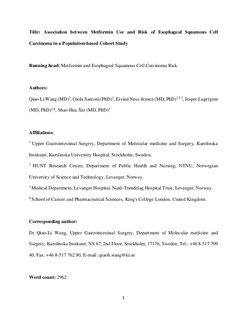Association Between Metformin Use and Risk of Esophageal Squamous Cell Carcinoma in a Population-Based Cohort Study
Journal article, Peer reviewed
Accepted version

View/
Date
2020Metadata
Show full item recordCollections
Original version
American Journal of Gastroenterology. 2020, 115 (1), 73-78. 10.14309/ajg.0000000000000478Abstract
4 ABSTRACT ObjectivesEsophageal cancer is a highly fatal malignant neoplasm, with two etiologically different histological types. A large prospective study is expected to elucidate the specific risk of the 90% subtype of esophageal cancer, esophageal squamous cell carcinoma, with metformin therapy. This study aims to determine the association between metformin use and incident esophageal squamous cell carcinoma risk. MethodsThis was a nationwide population-based prospective cohort study conducted inSwedenin 2005-2015.Among 8.4 million participants identified in the cohort, 411,603 (5%) were metformin users. The users were compared with 10 times as many frequency-matched non-users of metformin (n=4,116,030) by age and sex.Metformin use was treated as a time-varying variate and multivariable cause-specific proportional hazards model was used to calculate hazard ratios (HR) with 95% confidence intervals (CI) for esophageal squamous cell carcinoma, adjusted for age, sex, calendar year, residence area, tobacco smoking, alcohol overconsumption, and use of non-steroidal anti-inflammatory drugs or statins.ResultsThe incidence rates of esophageal squamous cell carcinoma were 3.5 per 100,000 person-years among the metformin users and 5.3 per 100,000 person-years in the non-users. Metformin users overall were at a decreased risk of esophageal squamous cell carcinoma compared with non-users (HR 0.68, 95% CI 0.54-0.85). The decrease in risk was more pronounced in new metformin users (HR 0.44, 95% CI 0.28-0.64) and participants aged 60-69 years (HR 0.45, 95% CI 0.31-0.66).ConclusionsMetformin use decreases the risk of developing esophageal squamous cell carcinoma